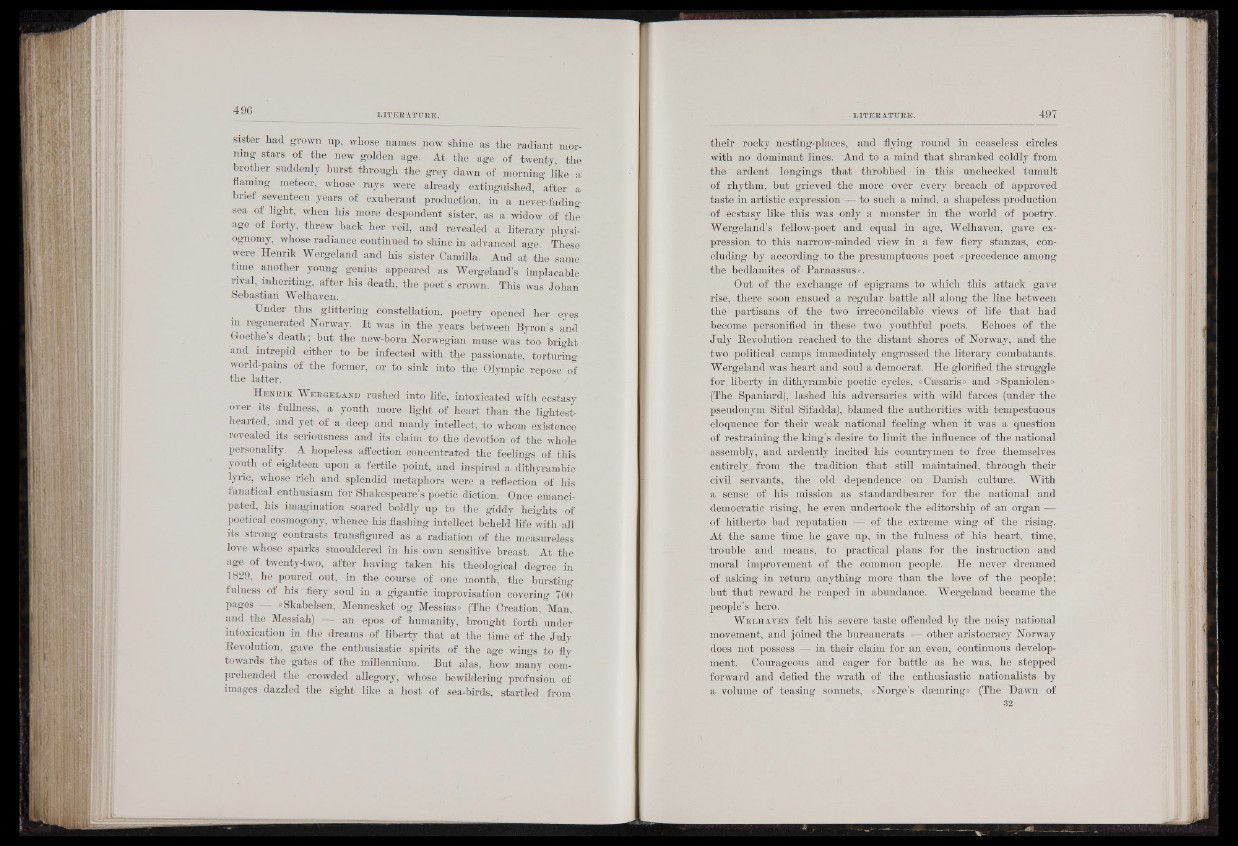
sister ta d grown up, whose names now shine as the radiant morning
stars of the new golden age. At the age of twenty, the
brother suddenly burst through the grey dawn of morning like a
flaming meteor, whose rays were already extinguished, after a
brief seventeen years of exuberant production, in a never-fading
sea of light, when his more despondent sister, as a widow of the
age of forty, threw back her veil, and revealed a literary physiognomy,
whose radiance continued to shine in advanced age. These
were Henrik Wergeland and his sister Camilla. And at the same
time another young genius appeared as Wergeland’s implacable
rival, inheriting, after his death, the poet’s crown. This was Johan
Sebastian Welhaven,
Under this glittering constellation, poetry opened her eyes
in regenerated Norway. I t was in the years between Byron’s and
Goethe s death; but the new-born Norwegian muse was too bright
and intrepid either to be infected with tlje passionate, torturing
world-pains of the former, or to sink into the Olympic repose of
the latter.
H e n r i k W e r g e l a n d rushed into life, intoxicated with ecstasy
over its fullness, a youth more light of heart than the lightest-
hearted, and yet of a deep and manly intellect, to whom existence
revealed its seriousness and its claim to the devotion of the whole
personality. A hopeless affection concentrated the feelings of this
youth of eighteen upon a fertile point, and inspired a dithyrambic
lyric, whose rich and splendid metaphors were a reflection of his
fanatical enthusiasm for Shakespeare’s poetic diction. Once emancipated,
his imagination soared boldly up to the giddy heights of
poetical cosmogony, whence his flashing intellect beheld life with all
its strong contrasts transfigured as a radiation of the measureless
love whose sparks smouldered in his own sensitive breast. At the
age of twenty-two, after having taken his theological degree in
1829, he poured out, in the course of one month, the bursting
fulness of his fiery soul in a gigantic improvisation covering 700
pages --s «Skabelsen, Mennesket og Messias» (The Creation, Man,
and the Messiah) — an epos of humanity, brought forth under
intoxication in the dreams of liberty that at the time of the July
Revolution, gave the enthusiastic spirits of the age wings to fly
towards the gates of the millennium. But alas, how many comprehended
the crowded allegory, whose bewildering profusion of
images dazzled the sight like a host of sea-birds, startled from
their rocky nesting-places, and flying round in ceaseless circles
with no dominant lines: And to a mind that shranked coldly from
the ardent longings that throbbed in this unchecked tumult
of rhythm, but grieved the more over every breach of approved
taste in artistic expression to such a mind, a shapeless production
of ecstasy like this was only a monster in the world of poetry.
Wergeland’s fellow-poet and equal in age, Welhaven, gave expression
to this narrow-minded view in a few fiery stanzas, concluding
by according to the presumptuous poet «precedence among
the bedlamites of Parnassus».
Out of the exchange of epigrams to which this attack gave
rise, there soon ensued a regular battle all along the line between
the partisans of the two irreconcilable views of life that had
become personified in these two youthful poets. Echoes of the
July Revolution reached to the distant shores of Norway, and the
two political camps immediately engrossed the literary combatants.
Wergeland was heart and soul a democrat. He glorified the struggle
for. liberty in dithyrambic poetic cycles, «Csesaris» and »Spaniolen»
(The Spaniard),. lashed his adversaries with wild farces (under the
pseudonym Siful Sifadda.), blamed the authorities with tempestuous
eloquence for- their weak national feeling when it was a question
of restraining the king’s desire to limit the influence of the national
assembly, and ardently incited his countrymen to free themselves
entirely, from the tradition that still maintained, through their
civil servants, the old dependence on Danish culture. With
a sense of his mission as standardbearer for the national and
democratic rising, he even undertook the editorship of an organ S
of hitherto bad reputation — of the extreme wing of the rising.
At the same time he gave up, in the fulness of his heart, time,
trouble and means, to practical plans for the instruction and
moral improvement of the common people. He never dreamed
of asking in return anything more than the love of the people;
but that r.eward he reaped in abundance. Wergeland became the
people’s hero.
W e l h a v e n felt his severe taste offended by the noisy national
movement, and joined the bureaucrats||g|other aristocracy Norway
does not possess -— in their claim for an even, continuous development.
Courageous and eager for battle as he was, he stepped
forward and defied the wrath of the enthusiastic nationalists by
a volume of teasing sonnets, «Norge’s dsemring» (The Dawn of